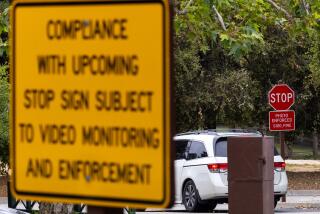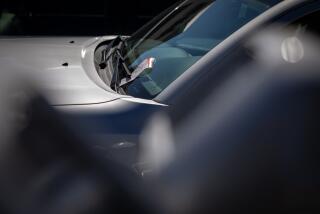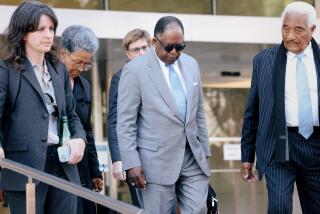Judge’s Ticket-Fixing Case Goes to Jury With Pleas From Both Sides
- Share via
A criminal conspiracy case against a Beverly Hills judge went to the jury Friday as the prosecutor and a defense attorney offered dramatically different appraisals of evidence presented during the four-week trial.
“You’re going to let us know whether a judge can fix tickets for his relatives or not,” Deputy Dist. Atty. Richard Healey said in his closing argument in the trial of Municipal Judge Charles D. Boags.
“We’re going to get some sense from you of what is justice, what is due administration of the law,” Healey told the jury in the Beverly Hills Courthouse, where Boags has continued to hear civil cases.
Defense counsel Johnnie L. Cochran Jr. told the jurors, “This case reminds us of one of Shakespeare’s famous lines. This case is ‘much ado about nothing’ when you get right down to it.
“I will tell you that he (Boags) made a mistake,” Cochran said. “But that mistake is not a crime.”
Boags, 59, is accused of conspiring to obstruct justice and due administration of the law by suspending the fines on more than 200 parking tickets issued to cars driven by the judge’s son and the youth’s friends. One automobile, which received 145 parking citations, was registered to the judge himself. The tickets were issued in 1984, 1985 and 1986.
A longtime deputy public defender who was appointed to the bench in 1979, Boags could be sentenced to up to a year in Los Angeles County Jail if he is convicted of the misdemeanor charge.
Healey presented 16 witnesses, including Beverly Hills court officials and several former Beverly Hills High School classmates of the judge’s son, Martin R. Boags. Several of the youths testified that they had given parking tickets to the younger Boags and never saw the tickets again. Martin Boags graduated from the high school in 1986 and became a cadet at the U.S. Air Force Academy.
Healey argued that the judge and his son had an informal agreement under which Martin Boags handed parking tickets over to his father with the understanding that the judge would suspend the fines.
“These tickets were being passed across the breakfast table, in essence,” Healey said. “Consider whether that is due administration of the law.”
The prosecutor added, “The judge had the right to suspend the fines, that’s true, but he did not have the right to enter into an agreement beforehand . . . ‘Give me the tickets, Marty, you’re going to get your fine suspended.’ ”
Cochran, who defended Boags along with attorney Richard G. Hirsch, told the jurors that the judge is an honest, honorable man who erred ethically by failing to disqualify himself from handling his son’s tickets. But Boags did not engage in a conspiracy, the crime with which he is charged, Cochran said.
18 Defense Witnesses
“The conspiracy started in Dick Healey’s mind and that’s where it continues to be, because he hasn’t proved it here,” Cochran said.
During the trial, the defense called 18 witnesses, including Martin Boags, two Superior Court judges and a senior Los Angeles County prosecutor, all of whom attested to Boags’ honesty and integrity, Cochran argued. The judge did not testify in his own behalf.
Cochran told jurors that court officials had established through their testimony that parking tickets are handled with lenience by most Beverly Hills judges because of the severe parking problems in the community, especially in the neighborhood of Beverly Hills High School.
Furthermore, Cochran said, Martin Boags made it clear that there was no conspiracy because the young man testified that he did not know what the disposition would be when he gave parking tickets to his father. Young Boags testified that he did not pay the fines himself or appear with the tickets before another judge, “because he (Charles Boags) is my father, he’s the breadwinner, he’s the one responsible for them,” Cochran told the jury.
“I think that Charles Boags has paid, and paid more than enough in this case,” Cochran said. The lawyer said he was “seeking justice for a judge who should never have been accused.”
But Healey had a different interpretation.
“When Marty told you he had no idea what the sentence would be . . . I don’t think you should believe that testimony,” the prosecutor said, noting that for more than two years the judge never forced his son to pay a fine or to perform community service.
“With Marty and his friends, the rule was simple,” Healey said, “one hundred percent of the fine was suspended 100% of the time.”
More to Read
Sign up for Essential California
The most important California stories and recommendations in your inbox every morning.
You may occasionally receive promotional content from the Los Angeles Times.













